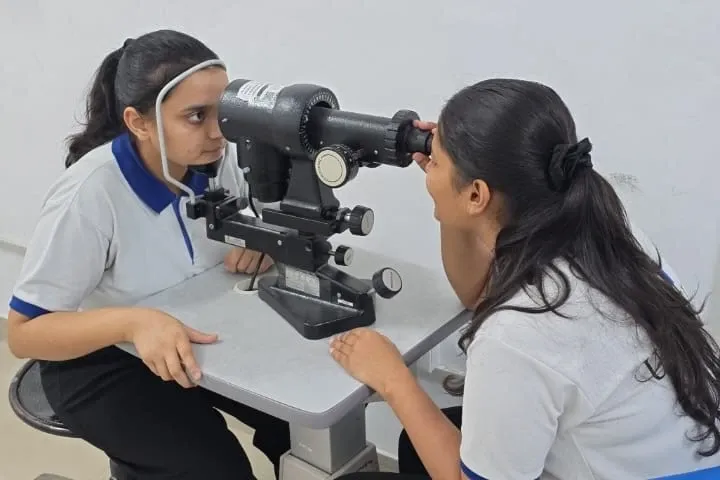The Department of Optometry at CT University is a center of excellence in vision science education, committed to developing healthcare professionals who are both skilled and compassionate. As part of the School of Allied Health Sciences, the department offers a four-year Bachelor of Optometry (B.Optom) program that blends theoretical knowledge with practical expertise.
Our mission is to create highly competent optometrists equipped with the technical know-how, clinical skills, and ethical understanding to meet the growing demands of eye and vision care. The curriculum is structured around the principles of Outcome-Based Education (OBE) and adheres to the AICTE Model Curriculum, ensuring quality and standardization in higher education.
With a strong focus on clinical training, the department prepares students to handle real-world challenges in diagnosing and managing ocular disorders. Students gain hands-on experience with advanced optometry equipment, participate in community eye care programs, and are groomed for both independent practice and collaborative roles in healthcare teams.
We aim to nurture professionals who are not only technically proficient but also socially responsible, capable of delivering compassionate care and contributing to national and global vision health initiatives.


The instruction plan for the Bachelor of Optometry program at CT University is built upon a structured and flexible approach, adhering to the Outcome-Based Education (OBE) model as prescribed by AICTE. Instruction is delivered through a variety of teaching methodologies to ensure maximum engagement and comprehension. The modes of instruction include theoretical lectures, tutorials, practical sessions, and project-based learning, including summer internships and fieldwork. These are delivered in four distinct modes: Lecture (L), Lecture + Practical (L+P), Practical (P), and Project (PJ).
The learning plan of the Optometry program is focused on nurturing competent, ethical, and industry-ready eye care professionals through a holistic educational experience. Students are exposed to an interdisciplinary curriculum that blends core optometry subjects with basic sciences, open electives, and soft skills. The program emphasizes clinical proficiency, technological adeptness, and critical thinking, ensuring that graduates are capable of addressing complex vision care challenges.
Learning is not limited to classrooms; it is extended into labs, clinical settings, outreach camps, and research projects, allowing students to apply theoretical knowledge in real-world scenarios. The curriculum fosters lifelong learning habits, problem-solving capabilities, and a deep understanding of modern diagnostic tools and optometry equipment. Students are also encouraged to develop professional behaviors, including empathy, communication skills, and ethical decision-making, essential for building patient trust and delivering high-quality eye care services.

Recognised
CT University has obtained the recognition/approval of the Bar Council of India to run its Law programs under the School of Law. Approval by UGC under Section 2(f) of the UGC Act, 1956. Approval by UGC under Section 22 of the UGC Act, 1956.

Years Legacy
CT University owes its genesis to the establishment of the CT Educational Society in Jalandhar in the year 1997. After the legacy of more than 22 years, CTU was established in 2017 under the excelling vision of Sardar Charanjit Singh Channi, Chancellor, CTU.

of CT University in India?
CTU Overall ranking by IIRF is 133 out of 171 colleges in India in 2023 CTU is a widely recognised and awarded university in India. CTU has excelled in providing quality education across various disciplines and ranked 26 in the ARIIA Rankings

Experience
There is excellent placements and job opportunities in CT University. Almost 75-80% of students get placed in many big firms. Major Co.s which visit the campus are TATA Motors, HDFC Bank, Mahindra & Mahindra, etc. The average package offered is around 5–10 lakhs.